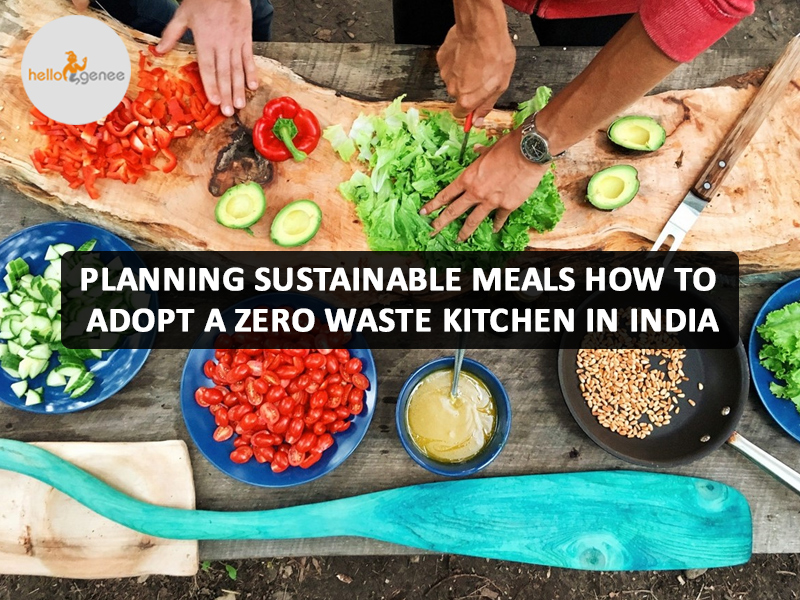Planning
Sustainable Meals - How to Adopt a Zero-Waste Kitchen in India
The greatest threat to our planet is the belief that
someone else will save it.
Robert Swan
Some
environmentalists believe that we are on the brink of another mass extinction,
and this time, it will be because of humans' excessive gorging and consumption
habits.
Wekk, it may sound
extreme, but in today's world, sustainability is no longer a choice; it is the
need of our generation; otherwise, we are hastily treading the path to
ecological Armageddon.
Are we ready for it? No, none of us are.
It's high time we
start taking action, and to tell you all the truth, sustainability begins at
home.
So, with that raging
thought, we are here with another insightful blog for you all.
Growing up in India, we were always taught that wasting food was wrong. Finishing everything on our plates and not letting leftovers go to waste was ingrained in us from a young age. However, as our kitchen habits modernized over the years, food waste inevitably crept in. Peels, offcuts, and leftovers began piling up in the trash. But there is a better way - embracing a zero-waste cooking approach. With some planning and minor changes, we can all minimize kitchen trash while enjoying wholesome, nutritious meals.
Let's look at some
tips and recipes to start your zero-waste cooking journey.
The Problem
of Food Waste

Did you know India wastes around 68.7 million tonnes of food annually according to the
UNEP?
Shocking right?
That's a staggering
amount considering many face hunger and malnutrition. As our lifestyles become
busier and we opt for more processed foods, leftovers often get dumped rather
than reused creatively in other dishes. Even seemingly small items like carrot
peels, banana skins and potato offcuts add up quickly in landfills. This needs
to be revised from both an ethical and environmental standpoint. With rising
living costs and plastic pollution issues affecting India, reducing food waste
makes sustainable sense.
Planning
Meals Effectively

Proper meal planning
is key to minimizing waste. Look through your fridge and pantry contents before
shopping to use up ingredients nearing expiry. Make a weekly menu with meals
that use similar ingredients to avoid duplication. For example, make a carrot
soup one night and use leftover carrots in a salad the next day. Buy only what
is required and check quantities against the menu to curb overbuying. Factor in
seasonal, local produce, which has lower carbon footprints. Consult farmer's
markets for soon-to-expire items at discounts, too.
Zero-waste
storage and Preparation

Some simple storage
swaps prevent waste. Use reusable containers, wraps and bags instead of
single-use plastic. Store fruits and veggies in perforated containers for
airflow. Plan to use peels, stalks, and rinds within a day or two of purchase
to avoid trimming later. For example, grate carrots peels into salads or cut
pumpkin seeds from stringy flesh. Finely chop onion tops, garlic husks and
carrot/beet greens for cooking. Freeze banana peels to make banana ice cream!
Even potato water left after boiling can be used in soups.
Creative
Recipes to Utilise Scraps
Here are some
delicious recipe ideas to use up kitchen scraps:
Vegetable peels and stalks stock: Simmer peels, ends, and sliced roots in water for a richly flavored stock base. Great for soups, curries and sauces.
● Kale,
carrot, and beet greens pesto: Blend
greens with nuts, garlic, and olive oil to top pasta, rice, or toast.
● Fruit
skins chutney: Grate apple,
mango, or banana skins and simmer with spices for relish with meals.
● Vegetable
trimmings frittata: Sauté
chopped scraps and pour over beaten eggs in muffin pans for portable
breakfasts.
● Banana peel ice cream: Soak the peels in milk overnight, then puree with condensed milk, nuts, and cardamom for a naturally sweet treat
These are just
starting ideas - get creative with your own innovations. Even in Indian
cuisine, very little is wasted from foods we consume daily. Apply the same
thinking to reduce kitchen waste.
Sustainable
Cooking Post-Covid

The pandemic shifted many homecooks focus to zero-waste as demand for certain ingredients fluctuated. Many restaurants switched to selling excess scraps and produce to home chefs for soups, salads, pickles, and more. As we transition back to everyday life, these sustainable habits must continue.
Composting food
scraps, ideally through local biodigester programs, diverts biodegradable
material from landfills to generate nutrient-rich soil fertilizers.
Community-supported agriculture provides access to seasonal crops directly from
farmers, reducing packaging. Slowly eliminating single-use plastics by
investing in stainless steel tiffins and containers also lessens our carbon
footprint.
Conclusion
We can all cook sustainably with some forethought in meal planning and getting creative with scraps. Zero-waste need not mean deprivation - chances are that peel or stalk can enrich another recipe. By wasting less and supporting local producers, we nourish both people and the planet. Let's continue embracing these ethical kitchen habits for a greener India. Happy zero-waste cooking!













Comments